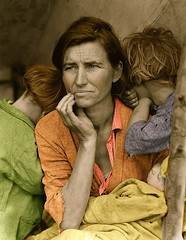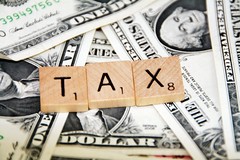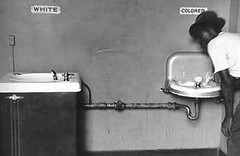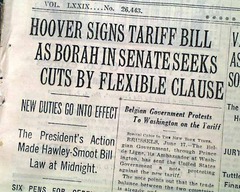| 6712086686 | The Great Depression | The deepest and longest-lasting economic downturn in the history of the Western industrialized world. In the United States, the Great Depression began soon after the stock market crash of October 1929, which sent Wall Street into a panic and wiped out millions of investors. |  | 0 |
| 6712086687 | Progressive Era | A period of widespread social activism and political reform across the United States, from the 1890s to 1920s. |  | 1 |
| 6712086688 | Prohibition | A nationwide constitutional ban on the production, importation, transportation and sale of alcoholic beverages that remained in place from 1920 to 1933. |  | 2 |
| 6712086689 | Women's suffrage | The women's right to vote, granted by the 19th amendment to the U.S. Constitution (1920). |  | 3 |
| 6712086690 | preservationists | Those who attempt to maintain in their present condition areas of the Earth that are so far untouched by humans. |  | 4 |
| 6712086691 | conservationists | Those who advocate for the sustainable use and management of natural resources including wildlife, water, air, and earth deposits, both -- renewable and non-renewable. |  | 5 |
| 6712086692 | Welfare State | A system whereby the government undertakes to protect the health and well-being of its citizens, especially those in financial or social need, by means of grants, pensions, and other benefits. The foundations for the modern welfare state in the US were laid by the New Deal programs of President Franklin D. Roosevelt. |  | 6 |
| 6712086693 | Liberalism | A viewpoint or ideology associated with free political institutions and religious toleration, as well as support for a strong role of government in regulating capitalism and constructing the welfare state. |  | 7 |
| 6712086694 | mass media | Diversified mediatechnologies that are intended to reach a large audience by mass communication. |  | 8 |
| 6712086695 | The Great Migration | The movement of 6 million African-Americans out of the rural Southern United States to the urban Northeast, Midwest, and West that occurred between 1910 and 1970. |  | 9 |
| 6712086696 | imperialist | A policy of extending a country's power and influence through diplomacy or military force. |  | 10 |
| 6712086697 | isolationism | A category of foreign policies institutionalized by leaders who asserted that their nations' best interests were best served by keeping the affairs of other countries at a distance. |  | 11 |
| 6712086698 | Spanish-American War | A conflict fought between Spain and the United States in 1898. Hostilities began in the aftermath of sinking of the USS Maine in Havana harbor leading to American intervention in the Cuban War of Independence. |  | 12 |
| 6712086699 | Treaty of Versailles | One of the peace treaties at the end of World War I. It ended the state of war between Germany and the Allied Powers. Signed on 28 June 1919, exactly five years after the assassination of Archduke Franz Ferdinand. |  | 13 |
| 6712086700 | League of Nations | An intergovernmental organization founded on 10 January 1920 as a result of the Paris Peace Conference that ended the First World War. It lacked an armed force to enforce policy and was not joined by the United States. |  | 14 |
| 6712086701 | fascism | An authoritarian and nationalistic right-wing system of government and social organization. |  | 15 |
| 6712086702 | totalitarianism | A political system where the state recognizes no limits to its authority and strives to regulate every aspect of public and private life wherever feasible. |  | 16 |
| 6712086703 | Axis Powers | Germany, Italy, and Japan, which were allied before and during World War II. |  | 17 |
| 6712086704 | Allied Powers | U.S., Britain, France, which were allied before and during World War II. |  | 18 |
| 6712086705 | Nazi Concentration Camp | A guarded compound for the detention or imprisonment of aliens, members of ethnic minorities, political opponents. Primarily Jewish Europeans during WWII. |  | 19 |
| 6712086706 | Holocaust | A genocide in which Adolf Hitler's Nazi Germany and its collaborators killed about six million Jews and members from other fringe social groups during World War II. |  | 20 |
| 6712086707 | Internment of Japanese Americans | Forced relocation and incarceration in camps in the interior of the U.S. of between 110,000 and 120,000 people of Japanese ancestry who had lived on the Pacific coast. |  | 21 |
| 6712086708 | Pacific "Island Hopping" | A military strategy employed by the Allies in the Pacific War against Japan and the Axis powers during World War II. The idea was to bypass heavily fortified Japanese positions and instead concentrate the limited Allied resources on strategically important islands that were not well defended but capable of supporting the drive to the main islands of Japan. |  | 22 |
| 6712086709 | D-Day | The landing operations on Tuesday, 6 June 1944 of the Allied invasion of Normandy in Operation Overlord during World War II. |  | 23 |
| 6712086710 | atomic bomb | A "fission" bomb dropped on Nagasaki and Hiroshima at the end of World War II. |  | 24 |
| 6712086711 | americanization | The process of assimilating American character, manner, ideals, culture, and so on. |  | 25 |
| 6712086712 | sphere of influence | The territory of weaker states where a powerful state exercises the dominant control. |  | 26 |
| 6712086713 | partition | In politics, the act of dividing a weaker territory or government among several more powerful states. |  | 27 |
| 6712086714 | bellicose | Disposed to fight or go to war. |  | 28 |
| 6712086715 | banana republic | A disparaging term for the small nations of Central America, with particular reference to their political instability and poor, single-crop economies. |  | 29 |
| 6712086716 | progressive | In politics, one who believes in continuing progress, improvement, or reform. |  | 30 |
| 6712086717 | exposé | A disclosure or revelation considered embarrassing to those involved. |  | 31 |
| 6712086718 | direct primary | In politics, the nomination of a party's candidates for office through a special election of that party's voters. |  | 32 |
| 6712086719 | initiative | In politics, the procedure whereby voters can, through petition, present proposed legislation directly to the electorate. |  | 33 |
| 6712086720 | referendum | The submission of a law, proposed or already in effect, to a direct vote of the electorate. |  | 34 |
| 6712086721 | recall | In politics, a procedure for removing an official from office through popular election or other means. |  | 35 |
| 6712086722 | insubordination | Deliberate disobedience to proper authority. |  | 36 |
| 6712086723 | entrepreneurship | The process whereby an individual initiates a business at some risk in order to expand it and thereby earn a profit. |  | 37 |
| 6712086724 | self-determination | In politics, the right of a people (usually based on ethnicity) to shape its own national identity and form a government, without outside coercion of influence. |  | 38 |
| 6712086725 | graduated income tax | A tax on income in which the taxation rates are progressively higher for those whit higher income. |  | 39 |
| 6712086726 | levy | A forcible tax or other imposition. |  | 40 |
| 6712086727 | enclave | A small territory surrounded by foreign or hostile territory. Enclaves were common among newly-arrived immigrant groups (e.g. "Chinatown" in San Francisco). |  | 41 |
| 6712086728 | censor | An official who examines publications, mail, literature, and so forth in order to remove or prohibit the distribution of material deemed dangerous or offensive. |  | 42 |
| 6712086729 | Northern Securities Co. v. U. S. (1904) | Re-established the authority of the federal government to fight monopolies under the Sherman Anti-Trust Act. |  | 43 |
| 6712086730 | Muller v. Oregon (1908) | First case to use the "Brandeis brief"; recognized a 10-hour work day for women laundry workers on the grounds of health and community concerns. |  | 44 |
| 6712086731 | Schenck v. U. S. (1919) | Unanimously upheld the Espionage Act of 1917 which declared that people who interfered with the war effort were subject to imprisonment; declared that the 1st Amendment right to freedom of speech was not absolute; free speech could be limited if its exercise presented a "clear and present danger." |  | 45 |
| 6712086732 | Korematsu v. U. S. (1941) | The court upheld the constitutionality of detention camps for Japanese-Americans during World War 2. |  | 46 |
| 6712086733 | belligerent | (adj.) given to fighting, warlike; combative, aggressive; (n.) one at war, one engaged in war |  | 47 |
| 6712086734 | Open Door Policy | The policy that China should be open to trade with all of the major powers, and that all, including the United States, should have equal right to trade there. This was the official American position toward China as announced by Secretary of State John Hay in 1899. |  | 48 |
| 6712086735 | socialism | An economic and governmental system based on public ownership of the means of production and exchange. |  | 49 |
| 6712086736 | Eugene Debs | Prominent socialist leader (and five time presidential candidate) who founded the American Railroad Union and led the 1894 Pullman Strike |  | 50 |
| 6712086737 | Roosevelt Corollary | Roosevelt's 1904 extension of the Monroe Doctrine, stating that the United States has the right to protect its economic interests in South And Central America by using military force. |  | 51 |
| 6712086738 | Industrial Workers of the World (IWW) | Founded in 1905, this radical union, also known as the Wobblies aimed to unite the American working class into one union to promote labor's interests. It worked to organize unskilled and foreign-born laborers, advocated social revolution, and led several major strikes. Stressed solidarity. |  | 52 |
| 6712086739 | Pure Food and Drug Act | Forbade the manufacture or sale of mislabeled or adulterated food or drugs, it gave the government broad powers to ensure the safety and efficacy of drugs in order to abolish the "patent" drug trade. Still in existence as the FDA. |  | 53 |
| 6712086740 | Teddy Roosevelt | Twenty-sixth president of the United States; he focused his efforts on trust busting, environment conservation, and strong foreign policy. |  | 54 |
| 6712086741 | William Taft | 27th president of the U.S.; he angered progressives by moving cautiously toward reforms and by supporting the Payne-Aldrich Tariff; he lost Roosevelt's support and was defeated for a second term. |  | 55 |
| 6712086742 | Triangle Shirtwaist Fire | March 1911 fire in New York factory that trapped young women workers inside locked exit doors; nearly 50 ended up jumping to their death; while 100 died inside the factory; led to the establishment of many factory reforms, including increasing safety precautions for workers |  | 56 |
| 6712086743 | segregation | Separation of people based on racial, ethnic, or other differences. Common in the South after the Civil War through the 1960s. |  | 57 |
| 6712086744 | Harlem Renaissance | Black literary and artistic movement centered in Harlem that lasted from the 1920s into the early 1930s that both celebrated and lamented black life in America; Langston Hughes and Zora Neale Hurston were two famous writers of this movement. |  | 58 |
| 6712086745 | Fourteen Points | The war aims outlined by President Wilson in 1918, which he believed would promote lasting peace; called for self-determination, freedom of the seas, free trade, end to secret agreements, reduction of arms and a league of nations. |  | 59 |
| 6712086746 | Red Scare | A social/political movement designed to prevent a socialist/communist/radical movement in this country by finding "radicals," incarcerating them, deporting them, and subverting their activities. Periods of Red Scare occurred after both World Wars in the United States. |  | 60 |
| 6712086747 | Sedition Act | A law passed by Congress in 1918 (during World War I) to make it illegal to say anything disloyal, profane, or abusive about the government or the war effort in WWI. Seen as a military necessity by some for effectively fighting in WWI. |  | 61 |
| 6712086748 | Emergency Quota Act | A government legislation that limited the number of immigrants from Europe which was set at 3% of the nationality currently in the U.S. It greatly limited the number of immigrants who could move to the U.S. And it reflected the isolationist and anti-foreign feeling in America as well as the departure from traditional American ideals. |  | 62 |
| 6712086749 | Scopes Trial | Also known as the Scopes Monkey Trial; 1925 court case argued by Clarence Darrow and William Jennings Bryan in which the issue of teaching evolution in public schools was debated. Highlighted the growing divide between rural (more conservative) and urban (more liberal) interests in the United States. |  | 63 |
| 6712086750 | Sacco and Vanzetti Trial | Nicola Sacco and Bartolomeo Vanzetti were Italian immigrants charged with murdering a guard and robbing a shoe factory in Braintree, Massachusetts. The trial lasted from 1920-1927. Convicted on circumstantial evidence; many believed they had been framed for the crime because of their anarchist and pro-union activities. |  | 64 |
| 6712086751 | Kellog-Briand Pact | Idealistic agreement signed in 1928 in which nations agreed not to pose the threat of war against one another. |  | 65 |
| 6712086752 | Herbert Hoover | Republican president at the outset of the Great Depression. As a Republican, he believed that the federal government should not interfere in economic problems; the severity of the Great Depression forced his hand to provide some federal assistance to those in need, but he mostly left these efforts to the states. |  | 66 |
| 6712086753 | Smoot-Hawley Tariff | One of Herbert Hoover's earliest efforts to protect the nation's farmers following the onset of the Great Depression. Tariff raised rates to an all-time high. |  | 67 |
| 6712086754 | Platt Amendment | This amendment to the new Cuban constitution authorized U.S. intervention in Cuba to protect its interests. Cuba pledged not to make treates with other countries that might compromise its independence, and it granted naval bases to the United States, most notable being Guantanamo Bay. |  | 68 |
| 6712086755 | Indian Reorganization Act | Government legislation that allowed the Indians a form of self-government and thus willingly shrank the authority of the U.S. government. It provided the Indians direct ownership of their land, credit, a constitution, and a charter in which Indians could manage their own affairs. |  | 69 |
| 6712086756 | Zoot Suit Riots | A series of riots in 1944 during World War II that broke out in Los Angeles, California, between Anglo American sailors and Marines stationed in the city, and Latino youths, who were recognizable by the zoot suits they favored. |  | 70 |
| 6712086757 | Yalta Conference | FDR, Churchill and Stalin met at Yalta. Russia agreed to declare war on Japan after the surrender of Germany and in return FDR and Churchill promised the USSR concession in Manchuria and the territories that it had lost in the Russo-Japanese War. |  | 71 |
| 6712086758 | William Jennings Bryan | United States lawyer and politician who advocated free silver and prosecuted John Scopes (1925) for teaching evolution in a Tennessee high school (1860-1925). |  | 72 |
| 6712086759 | Woodrow Wilson | (1856-1924) President of the United States (1913-1921) and the leading figure at the Paris Peace Conference of 1919. He was unable to persuade the U.S. Congress to ratify the Treaty of Versailles or join the League of Nations. |  | 73 |
| 6712086760 | United Nations | An international organization formed after WWII to promote international peace, security, and cooperation. |  | 74 |
| 6712086761 | communism | A political theory derived from Karl Marx, advocating class war and leading to a society in which all property is publicly owned and each person works and is paid according to their abilities and needs. |  | 75 |
| 6712086762 | Bolshevik Revolution | The overthrow of Russia's Provisional Government in the fall of 1917 by Lenin and his Bolshevik forces, made possible by the government's continuing defeat in the war, its failure to bring political reform, and a further decline in the conditions of everyday life. |  | 76 |
AP US History Period 7 (1890-1945) Flashcards
Primary tabs
Need Help?
We hope your visit has been a productive one. If you're having any problems, or would like to give some feedback, we'd love to hear from you.
For general help, questions, and suggestions, try our dedicated support forums.
If you need to contact the Course-Notes.Org web experience team, please use our contact form.
Need Notes?
While we strive to provide the most comprehensive notes for as many high school textbooks as possible, there are certainly going to be some that we miss. Drop us a note and let us know which textbooks you need. Be sure to include which edition of the textbook you are using! If we see enough demand, we'll do whatever we can to get those notes up on the site for you!

